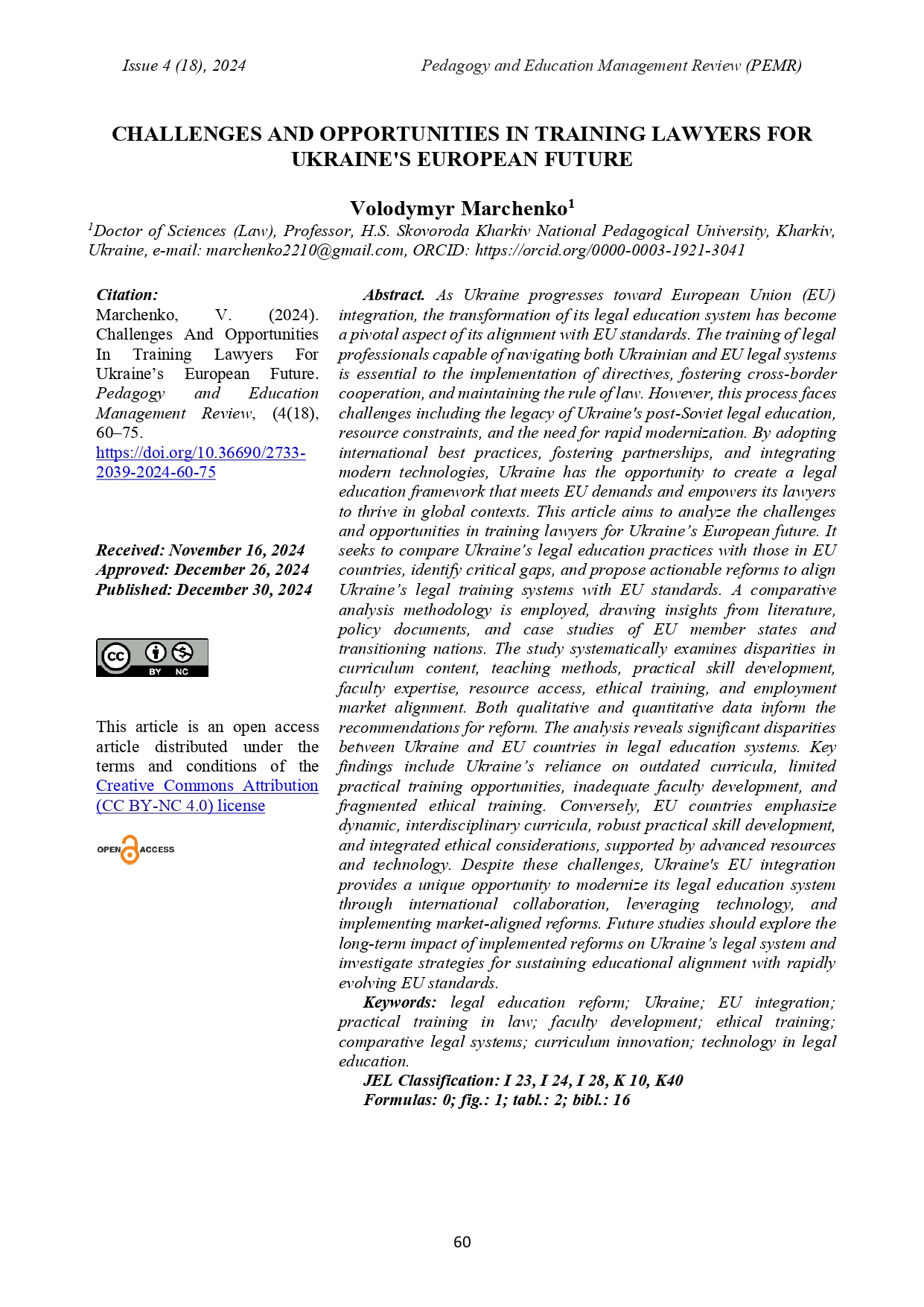CHALLENGES AND OPPORTUNITIES IN TRAINING LAWYERS FOR UKRAINE'S EUROPEAN FUTURE
DOI:
https://doi.org/10.36690/2733-2039-2024-60-75Keywords:
legal education reform, Ukraine, EU integration, practical training in law, faculty development, ethical training, comparative legal systems, curriculum innovation, technology in legal educationAbstract
As Ukraine progresses toward European Union (EU) integration, the transformation of its legal education system has become a pivotal aspect of its alignment with EU standards. The training of legal professionals capable of navigating both Ukrainian and EU legal systems is essential to the implementation of directives, fostering cross-border cooperation, and maintaining the rule of law. However, this process faces challenges including the legacy of Ukraine's post-Soviet legal education, resource constraints, and the need for rapid modernization. By adopting international best practices, fostering partnerships, and integrating modern technologies, Ukraine has the opportunity to create a legal education framework that meets EU demands and empowers its lawyers to thrive in global contexts. This article aims to analyze the challenges and opportunities in training lawyers for Ukraine’s European future. It seeks to compare Ukraine’s legal education practices with those in EU countries, identify critical gaps, and propose actionable reforms to align Ukraine’s legal training systems with EU standards. A comparative analysis methodology is employed, drawing insights from literature, policy documents, and case studies of EU member states and transitioning nations. The study systematically examines disparities in curriculum content, teaching methods, practical skill development, faculty expertise, resource access, ethical training, and employment market alignment. Both qualitative and quantitative data inform the recommendations for reform. The analysis reveals significant disparities between Ukraine and EU countries in legal education systems. Key findings include Ukraine’s reliance on outdated curricula, limited practical training opportunities, inadequate faculty development, and fragmented ethical training. Conversely, EU countries emphasize dynamic, interdisciplinary curricula, robust practical skill development, and integrated ethical considerations, supported by advanced resources and technology. Despite these challenges, Ukraine's EU integration provides a unique opportunity to modernize its legal education system through international collaboration, leveraging technology, and implementing market-aligned reforms. Future studies should explore the long-term impact of implemented reforms on Ukraine’s legal system and investigate strategies for sustaining educational alignment with rapidly evolving EU standards.
Downloads
References
Chuienko, V. (2024). The role of international scientific and practical cooperation in the sphere of modern legal education: Challenges, ways of strengthening, results.The Journal of International Legal Communication. http://surl.li/zavfyk
COMMUNICATION FROM THE COMMISSION TO THE EUROPEAN PARLIAMENT, THE COUNCIL, THE EUROPEAN ECONOMIC AND SOCIAL COMMITTEE AND THE COMMITTEE OF THE REGIONS on a European strategy for universities {SWD(2022) 6 final}. http://surl.li/pjnihj
COMMISSION STAFF WORKING DOCUMENT. Analytical Report following the Communication from the Commission to the European Parliament, the European Council and the Council Commission Opinion on Ukraine’s application for membership of the European Union. http://surl.li/mnkkco
Garasumiv, T. Z., Chornopyska, V. Z., & Baran, A. V. (2022). Current problems of the impact of gender equality in the administration of justice in Ukraine.Acta Universitatis Carolinae Iuridica. http://surl.li/bwoyus
Holovko, S. G. (2020). Dual education as an effective tool for forming professional competence of future lawyers. Scientific works of National Aviation University Series Law Journal Air and Space Law. http://surl.li/eohssq
Hryhorash, O. (2022). Mechanism of private funding of higher education in OECD countries and Ukraine. EUROPEAN HUMANITIES STUDIES: State and Society, (3), 18-29. https://doi.org/10.38014/ehs-ss.2022.3.02
Kelley, C. R., & Kiršienė, J. (2015). The role of ethics in legal education of post-Soviet countries. Baltic Journal of Law & Politics. http://surl.li/vhmxtk
Kyselova, T. (2017). Mediation in Ukraine: Challenges of peace and war. SSRN Electronic Journal. http://surl.li/qmkrew
Legal Tech in Legal Education: Global Perspectives 2024. http://surl.li/znnvsf
LLMs and Legal Education: Integrating Technology to Prepare Future Lawyers for the Digital Age. https://gaper.io/llms-and-legal-education-integrating/
Marcus Smith. Integrating technology in contemporary legal education. http://surl.li/knlfhe
OECD (2021), Education at a Glance 2021: OECD Indicators, OECD Publishing, Paris, https://doi.org/10.1787/b35a14e5-en.
Romanadze, L. (2022). Mediation in post-war restoration in Ukraine.Access to Justice in Eastern Europe. http://surl.li/tytkau
Supporting education reforms and skills in the Eastern Partnership region. http://surl.li/syoyeg
Technology in education. https://www.unesco.org/gem-report/en/technology
2024 Legal Tech Trends Report. http://surl.li/jruwnh







